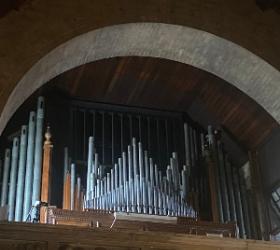
Friend, colleague, and mentor--Wesley Vos, associate editor of The Diapason since 1967--died on May 9 at the age of 61, from complications of liver disease. An obituary appears on page 6 of this issue, recounting some of the professional and personal events of his life--his birth and death dates, education, career history, etc. While these details provide a glimpse of a very full, though far too short, life, they fail to convey the depth and breadth of the man we knew and loved.
Wesley was quite a remarkable man--a man of profound faith, dedication, perseverance, and accomplishments. A much wider picture of his life was provided at the memorial service, May 18, at the family's church, First Congregational of Crystal Lake. Members of the Vos family (his wife, sons, daughter-in-law, brother, sister, grandchildren) spoke eloquently and lovingly of this man of courage, compassion, and vision. They painted a beautiful picture of a devoted husband, father, grandfather and brother. The presentations were thematically arranged according to the seasons of his life. A visual representation appeared on the chancel wall in the form of four paintings that Wesley had done, entitled "The Seasons." These paintings had adorned the walls of Wesley's office at DePaul University and were moved to the church for the memorial service. They were also reproduced on the bulletin cover for the service.
Music for the service was provided by the very fine and large Vestry Choir of the church under the direction of Eva Wedel, minister of music, and organist Barbara Thorsen. For a number of years, when he wasn't "on the bench" as a professional organist, Wesley sang in his church choir. In addition, The Chicago Master Singers, under the direction of Alan Heatherington, sang several motets, and the two choirs combined for "E'en so, Lord Jesus, quickly come," by Paul Manz, and "How lovely is Thy dwelling place" from the Brahms Requiem. I was honored to accompany the Brahms and also play the postlude, Bach's "In dir ist Freude," which had been the postlude at the wedding of Wesley and Marie Ann.
The last several years had not been easy for Wes. His third transplanted liver from 1991 had extended his life, but it too began to fail. During the year 2000, Wes suffered a number of serious infections and spent much of that summer in the hospital. In October of 2000, he relunctantly went on medical leave from The Diapason, DePaul University, and his organist position at St. Paul's UCC in Palatine. Over the next year and a half he waited on the national liver transplant list and spent much time in and out of the University of Chicago Hospital, trying various anitbiotics and other treatments. Late in the fall of 2001, the hospital liver team told Wesley that they could no longer consider him a viable candidate for a transplant. Wesley then pursued alternative treatment at Northwestern Memorial Hospital and held out hope for a new liver. In mid-March of this year, that hospital told him that a transplant was just too risky. Wes returned home, where he spent his last weeks surrounded by loving family and friends.
Throughout this time, Wesley never lost hope or indulged in self-pity. Rather, he cherished each day, living it as fully as possible, and keeping alive the hope for a transplant and a return to his full schedule of activities.
Wesley Vos was largely responsible for my joining the staff of The Diapason. I had known Wes since 1971, and when I began teaching organ at DePaul in 1974, he was always willing to listen to the concerns of a young teacher and offer advice and encouragement. When the post of editor of The Diapason became open in 1983, Wes suggested that I apply for the position and championed my application to the owners of the magazine. Despite my lack of experience in journalism or publishing, Wesley was certain that a knowledge of the organ and church music field was the most important qualification, and that the mechanics of publishing the journal could be learned by doing. His patient and thorough mentoring during my early years with The Diapason, along with his extensive knowledge of the magazine and the organ field, were the only things that kept the journal going. No matter how big a mess I would make of things, or how many crises arose, Wes would always calmly assess the situation, analyze what needed to be done, and map out a solution.
Wesley Vos was passionately devoted to The Diapason, and jealously guarded its scholarly and professional standards against any commercial pressures. His knowledge of the magazine and his recall of published articles and news over the years was quite incredible. He was especially demanding in evaluating submitted articles, was quick to sift out puffery or self-aggrandizement, and had no patience for the superficial or pseudo-scholarly.
During the memorial service, Wesley was described as a life-long teacher. Indeed, he excelled in the classroom and was admired, respected and loved by the DePaul community. He was an inspiring teacher, and reveled in giving students the means to learn and achieve on their own. He brought that patience and insight as a teacher to mentoring me at The Diapason. I am forever grateful for his wisdom, generous spirit, and friendship.
We mourn the loss of a friend and colleague, honor the memory of this remarkable human being, and are indeed richer for having known him. The memorial service closed with a poem that Wesley had written earlier this year. We reprint that poem below.
--Jerome Butera
"Evening Prayer"
O Lord, as the
gift of daylight fades,
the shadows of evening
fall gently around us.
May the fire of
your love burn ever
brighter in our hearts.
May our sleep be
restful, and may we
waken refreshed with renewed
energy and a sense
of your divine purpose.
--Wesley Vos, January 2, 2002




